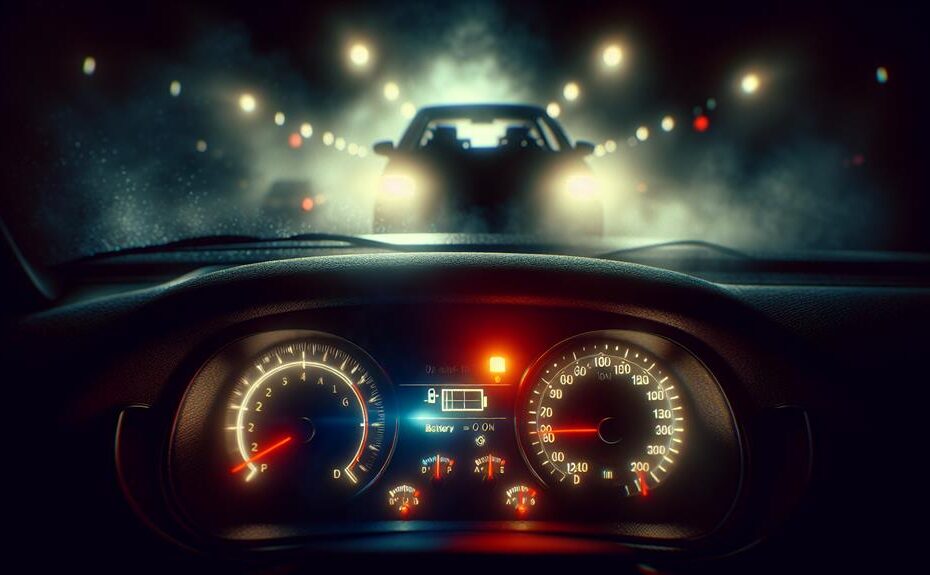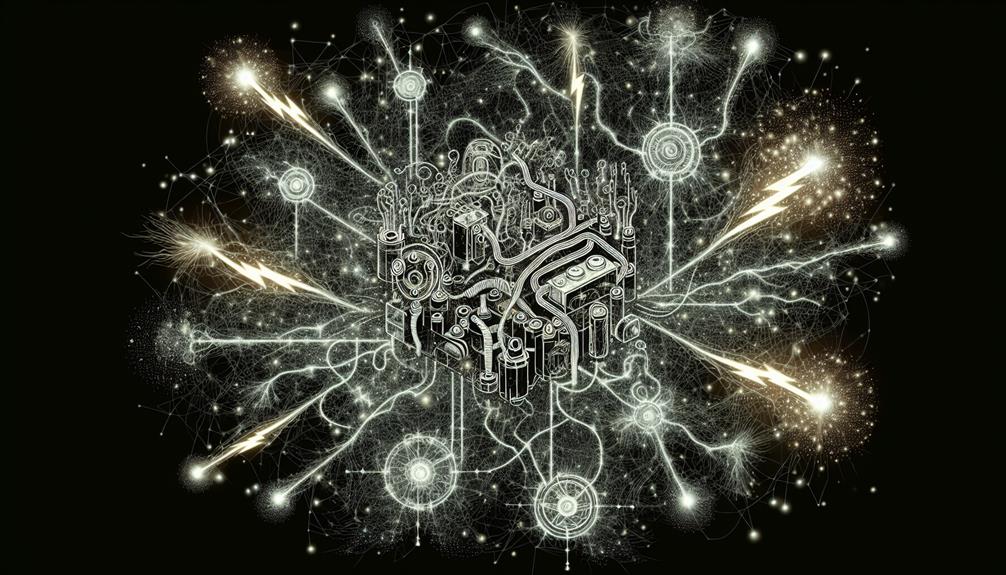Hey there, fellow motorist! Picture this: you're cruising down the road, enjoying the open air and the sweet sound of your favorite tunes. But wait, what's that? The lights in your car start to dim, almost as if they're flickering. Uh oh, not a good sign.
Don't panic just yet, but it seems like your car's electrical system might be on the fritz. Before you get stranded on the side of the road or face some serious car troubles, it's crucial to be aware of the warning signs that your car's electrical system is failing. Trust me, you don't want to be caught off guard when things go haywire.
So, buckle up and let's dive into the seven telltale signs that your car's electrical system might be in trouble.
Key Takeaways
- Dimming or flickering lights can indicate a failing car electrical system and should not be ignored.
- Unresponsive or intermittent electrical components may point to underlying issues that need to be addressed promptly.
- Inconsistent power supply can lead to loss of functionality in various electrical components and even sudden shutdowns while driving.
- Non-functioning lights and unreliable electronic controls should be repaired or replaced to ensure safety and reliability on the road.
Dimming or Flickering Lights
Are your car lights dimming or flickering? This could be a warning sign of a failing car electrical system. Dimming or flickering lights can be caused by various factors, all of which indicate potential electrical problems in your vehicle.
One common cause of dimming or flickering lights is a weak or failing alternator. The alternator is responsible for charging the battery and supplying power to the car's electrical system. If it isn't functioning properly, it can result in insufficient power being delivered to the lights, causing them to dim or flicker.
Another possible cause is a loose or corroded connection in the electrical system. When connections become loose or corroded, they can disrupt the flow of electricity, leading to fluctuations in the power supply to the lights.
Additionally, a faulty voltage regulator can cause the lights to dim or flicker. The voltage regulator regulates the voltage being supplied to the lights, and if it malfunctions, it can result in irregular power output.
If you notice dimming or flickering lights, it's important to have your car's electrical system inspected and repaired by a qualified technician. Ignoring these warning signs can lead to more severe electrical problems and potential safety hazards.
Unresponsive or Intermittent Electrical Components
If you've noticed that your car's electrical components have become unresponsive or intermittent, it could be a sign of an underlying issue.
One possible cause is an inconsistent power supply, which can result in a loss of functionality in various electrical components.
Another indication is non-functioning lights, such as headlights or interior lights, which may fail to turn on or flicker inconsistently.
Additionally, unreliable electronic controls, such as power windows or the radio, may not respond consistently or may completely stop working.
Inconsistent Power Supply
Unresponsive or intermittent electrical components can be indicative of an inconsistent power supply in your car's electrical system. When your car experiences inadequate power supply, it can lead to various issues with the electrical components. Here are some warning signs to look out for:
- Flickering lights: If your headlights or interior lights flicker or dim while driving, it may indicate fluctuating power supply.
- Unpredictable performance: When electrical components such as power windows, radio, or air conditioning work intermittently or fail to respond, it suggests an unstable power source.
- Sudden shutdowns: If your car suddenly loses power or shuts off while driving, it could be a result of electrical surges disrupting the power flow.
It is important to address these issues promptly to prevent further damage and ensure a safe and reliable driving experience.
Non-Functioning Lights
When experiencing non-functioning lights or intermittent electrical components in your car, it is crucial to address these issues promptly to ensure a safe and reliable driving experience. Faulty wiring or electrical surges can be the underlying causes of these problems. Faulty wiring may result in a lack of power reaching the lights, causing them to not function properly or at all. On the other hand, electrical surges can damage the electrical system, leading to intermittent issues with the lights. To diagnose and fix these issues, it is recommended to consult a professional mechanic who can perform a thorough inspection of the car's electrical system. Ignoring non-functioning lights can compromise your safety on the road, so it's important to take action as soon as possible.
| Potential Causes | Symptoms | Solutions |
|---|---|---|
| Faulty wiring | Lights not working or flickering | Replace or repair faulty wiring |
| Electrical surges | Lights turning on and off intermittently | Install surge protection devices or replace damaged components |
Unreliable Electronic Controls
To ensure your car's electrical system functions reliably, it's important to address any issues with unreliable electronic controls, such as unresponsive or intermittent electrical components. Unstable voltage and faulty wiring can cause these problems, leading to a frustrating and potentially unsafe driving experience.
Here are some warning signs to watch out for:
- Unresponsive dashboard controls: When your car's electronic controls, like the radio or AC, fail to respond to your commands, it could indicate an issue with the electrical system.
- Intermittent power windows: If your power windows work only sporadically or get stuck halfway, it may be a sign of an electrical problem.
- Flickering headlights: When your headlights dim or flicker while driving, it suggests an unstable voltage, which can be a result of a failing electrical system.
Addressing these issues promptly will help prevent further damage and ensure that your car's electrical system remains reliable.
Difficulty Starting the Car
If your car is having trouble starting, it may be a clear indication of a failing car electrical system. Starting problems can occur due to various car ignition issues and can be frustrating for any car owner. When you turn the key in the ignition, the electrical system should provide the necessary power to start the engine. However, if there's a problem with the electrical system, it can result in difficulty starting the car.
One common cause of starting problems is a weak or dead battery. The battery provides the initial electrical power to start the engine, and if it isn't functioning properly, it can lead to starting issues. Another possible cause is a faulty starter motor or solenoid. These components are responsible for physically turning the engine and can fail over time. Additionally, a malfunctioning ignition switch or a faulty ignition relay can prevent the electrical current from reaching the starter motor.
To diagnose the exact cause of the starting problem, it's recommended to take your car to a qualified mechanic. They'll be able to perform a thorough inspection of the car's electrical system and identify any potential issues. It's important to address starting problems promptly as they can lead to more serious electrical system failures if left unresolved.
Strange Smells or Burning Odors
If you notice strange smells or burning odors coming from your car, it could indicate a potential issue with the electrical system. Ignoring these warning signs could lead to further damage and costly repairs. Here are some key points to consider:
- Electrical Short Circuit: A burning smell could be a result of an electrical short circuit. This occurs when a wire or connection is damaged and causes a surge of electricity. The heat generated by the short circuit can produce a distinct burning odor.
- Overheating Components: Electrical issues can cause certain components, such as the alternator or starter motor, to overheat. When these components reach high temperatures, they can emit a burning smell. This smell is often accompanied by smoke or visible signs of burning.
- Melting Insulation: Electrical problems can cause insulation on wires to melt, creating a noticeable burning odor. This can occur due to excessive heat or a fault in the wiring system.
If you experience any of these burning smells, it's crucial to have your car inspected by a qualified mechanic. They can diagnose and address the electrical issue before it causes further damage to your vehicle. Remember, prompt attention to electrical issues can help prevent more extensive and costly repairs in the future.
Dead Battery or Frequent Jump Starts
Experiencing a dead battery or needing frequent jump starts can be indicative of a failing car electrical system. A healthy electrical system is crucial for the proper functioning of your vehicle, as it powers essential components like the starter motor, lights, and ignition system. When the electrical system starts to fail, it can lead to a drained battery, leaving you stranded and in need of a jump start.
To help you understand the signs of a failing car electrical system, here is a table outlining the common symptoms and their possible causes:
| Symptom | Possible Cause |
|---|---|
| Dead battery after a short period | Faulty alternator or parasitic drain |
| Frequent need for jump starts | Weak battery or failing alternator |
| Difficulty starting the engine | Faulty ignition switch or starter motor |
| Dim or flickering lights | Loose or corroded battery terminals or failing alternator |
To prevent a dead battery or frequent jump starts, regular battery maintenance is essential. This includes checking the battery's connections, ensuring they are tight and free from corrosion. Additionally, keeping an eye on the battery's age and replacing it when necessary can help avoid unexpected breakdowns.
In some cases, alternative power sources such as hybrid or electric vehicles can offer a more reliable and efficient solution. These vehicles utilize advanced electrical systems and batteries that require less maintenance and provide longer-lasting power.
Malfunctioning Dashboard Gauges
When your car's electrical system begins to fail, another common sign to look out for is malfunctioning dashboard gauges. These gauges, located on the instrument panel of your vehicle, provide crucial information about the engine's performance, fuel levels, and other vital parameters. A malfunctioning dashboard display can be a clear indication of a faulty instrument panel, which is often caused by electrical issues within the car.
Here are three signs that your dashboard gauges may be malfunctioning due to a failing electrical system:
- Erratic or inaccurate readings: If you notice that the gauges on your dashboard are displaying inconsistent or incorrect readings, it could be a sign of an electrical problem. For example, your fuel gauge might show an incorrect fuel level or the temperature gauge might fluctuate rapidly.
- Non-functional gauges: A failing electrical system can cause certain gauges on your dashboard to stop working altogether. This could include your speedometer, tachometer, or even warning lights that indicate issues with the engine or other components.
- Dim or flickering lights: If the lights behind your dashboard gauges are dim or flickering, it could indicate a problem with the electrical connections. This can affect the visibility of the gauges, making it difficult to read the information they provide.
If you notice any of these signs, it's important to have your car's electrical system inspected by a qualified technician. Ignoring these issues can lead to further electrical problems and potentially impact the overall performance and safety of your vehicle.
Blown Fuses or Tripped Circuit Breakers
If you find yourself constantly replacing fuses or dealing with tripped circuit breakers in your car's electrical system, it's important to address the issue promptly.
Blown fuses and tripped circuit breakers are clear indications of electrical system malfunction.
Fuse Replacements
To address blown fuses or tripped circuit breakers, promptly replace them to restore proper functionality to your car's electrical system. Fuse replacements are essential for maintaining the integrity of your car's electrical components.
Here are three key points to consider:
- Fuse upgrades: Upgrading your fuses can provide better protection for your car's electrical system. It ensures that the right amount of current flows through the circuit, preventing damage caused by overloading or short circuits.
- Fuse maintenance: Regularly checking and maintaining your fuses can prevent unexpected electrical failures. Inspect them for signs of damage, such as melted or discolored plastic, and replace any faulty ones immediately.
- Proper installation: When replacing fuses, make sure to use the correct type and rating specified by your car's manufacturer. Incorrectly installed fuses can lead to electrical malfunctions and potential hazards.
Circuit Breaker Troubleshooting
When addressing blown fuses or tripped circuit breakers, troubleshooting the circuit breaker is an important step to diagnose and resolve any electrical issues in your car. Circuit breaker maintenance is essential to ensure the proper functioning of your car's electrical system. Common causes of circuit breaker failure include overloading, short circuits, and faulty wiring.
To troubleshoot a circuit breaker, start by checking the breaker panel for any tripped breakers. If a breaker has tripped, reset it and observe if it trips again. If it does, there may be an underlying issue that needs to be addressed.
Additionally, inspect the wiring connected to the circuit breaker for any signs of damage or loose connections. Regular inspection and maintenance of your circuit breakers can help prevent electrical failures in your car.
Electrical System Malfunctions
Addressing blown fuses or tripped circuit breakers in your car's electrical system requires diagnosing and resolving any underlying issues, making it crucial to properly troubleshoot the circuit breaker. Neglecting such malfunctions can lead to further damage and potential safety hazards.
Here are some common causes of electrical system failures:
- Overloaded circuits: Excessive use of high-powered devices can cause fuses to blow or circuit breakers to trip.
- Short circuits: When two wires come into contact or a wire gets damaged, it can create a shortcut and cause fuses to blow.
- Aging components: Over time, electrical components can deteriorate, leading to increased chances of blown fuses or tripped circuit breakers.
Regular electrical system maintenance and inspections can help identify and address these issues before they escalate. It's recommended to consult a professional technician to ensure the safe and reliable operation of your car's electrical system.
Frequently Asked Questions
Can a Failing Car Electrical System Cause Other Issues With the Vehicle's Performance?
A failing car electrical system can have negative effects on your vehicle's performance. It can impact fuel efficiency and compromise vehicle safety. It's important to address any warning signs promptly to avoid further issues.
How Long Does It Typically Take for a Car's Electrical System to Fail Completely?
To prevent a car's electrical system from failing completely, be vigilant for warning signs. Ignoring them can lead to safety hazards. The time it takes for a system to fail completely varies.
Are There Any Specific Brands or Models of Cars That Are More Prone to Experiencing Electrical System Failures?
Are there specific car brands or models that are more prone to electrical system failures? No, there isn't any evidence to suggest that certain brands or models are more susceptible. However, regular maintenance can help prevent electrical system failures.
Can a Failing Car Electrical System Be Fixed or Is It Necessary to Replace the Entire System?
You can fix a failing car electrical system or replace it entirely. The cost of repairing depends on the specific issue, while replacing the entire system can be more expensive. Common causes of failures include faulty wiring and a drained battery.
Are There Any Warning Signs That Indicate a Failing Car Electrical System That Are Not Mentioned in the Article?
If you're wondering about warning signs of a failing car electrical system, it's important to be aware of any flickering lights, difficulty starting the engine, or a dead battery. These symptoms could indicate potential issues.
Conclusion
So, if you're tired of a smooth-running car and want to experience the thrill of constant electrical failures, look no further!
Just ignore these warning signs and watch as your lights flicker, your components go haywire, and your car refuses to start.
Don't forget the bonus of strange smells and burning odors!
Oh, and who needs a working battery or functioning gauges anyway?
Just sit back and enjoy the chaos.



